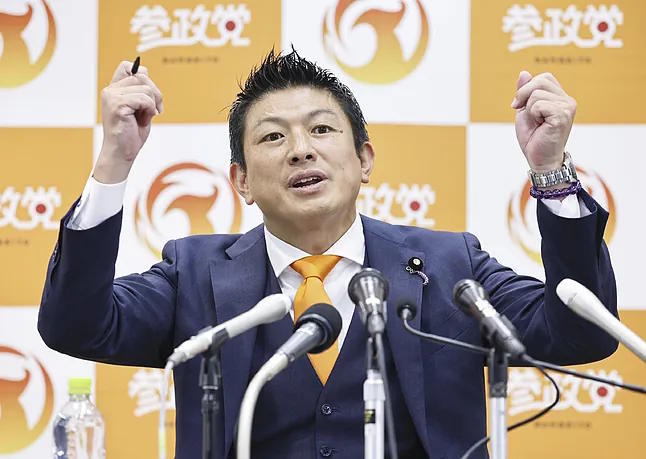In late 2020, when Japan maintained one of the strictest lockdown policies during the pandemic, a series of videos promoted by a new political party, Sanseito, emerged on YouTube, claiming that Covid, vaccines, masks, and lockdowns were part of a sinister plan by globalist elites. Playing on the fear of a virus manipulated in a laboratory, they aimed to control the world's population by injecting microchips through serums.
As the frustration of many Japanese people grew due to the prolonged closures and tracking applications, the videos became increasingly popular. Behind many of them, as the most visible face, was a well-known politician named Sohei Kamiya, who had made a career in the ruling Liberal Democratic Party (LDP).
After failing in his bid to become a candidate for the conservative party in the general elections, Kamiya, who belonged to the hardline faction of the LDP led by former Prime Minister Shinzo Abe, decided to form his own party, which won its first seat in the Senate in 2022. In the 2024 legislative elections, they secured three seats in Parliament.
On Sunday, elections were held again to renew half of the 248 seats in the Upper House. The surprise was the emergence of Kamiya's Sanseito, winning 14 seats and positioning itself as the third opposition force, moving to the forefront of politics from the marginal space it had occupied until now in the world's fourth-largest economy.
Kamiya (47 years old), a former Self-Defense Forces reservist, has garnered many votes from right-wing voters fed up with the failed policies of the ruling coalition led by the LDP, which lost its majority in this election.
The current crisis due to high rice prices, a staple food in the Japanese diet, has taken a toll on Prime Minister Shigeru Ishiba. However, local analysts argue that Sanseito's greatest success has been in convincing Japanese people, especially men between 30 and 50 years old who are frustrated with traditional parties, that a "silent invasion of immigrants" is looming in a country where foreign residents barely represent 3% of a population of over 120 million people.
This campaign stems from the relaxation of some government immigration policies at a time when Tokyo increasingly needs foreign labor due to the country's aging population: around 30% of the population is 65 years or older.
During the campaign, Kamiya explained that he was inspired by Donald Trump to present his slogan "Japanese first!" He has also criticized the LGBTQ community and "deceptive" feminist policies. In a speech, he even said that women should stay at home taking care of their children.
The far-right leader, who has publicly declared himself a fan of Trump's "bold political style," is now the face of a rising party that has called for breaking the peaceful post-war Constitution and defends old slogans from the imperial era justifying Japan's expansion into other parts of Asia to extend its dominance.
A series of controversial messages that he has mainly disseminated through social media in a well-coordinated campaign, avoiding direct scrutiny from traditional media, which have been highly critical of the so-called 'Japanese Trump'.
